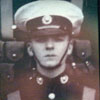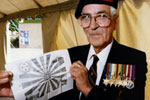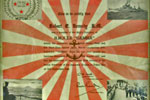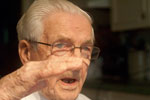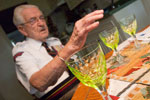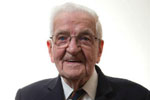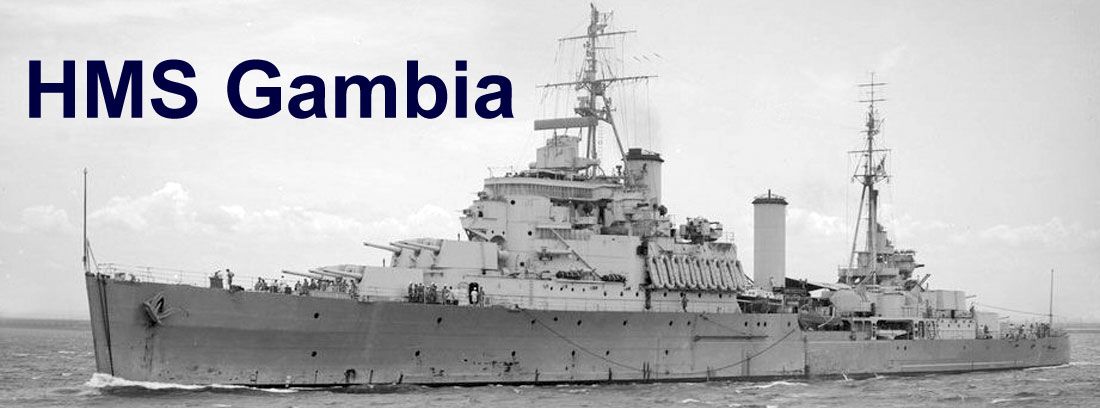
Robert Edward (Bob) Kennedy
From Veteran Stories: Robert Edward Kennedy - The Memory Project
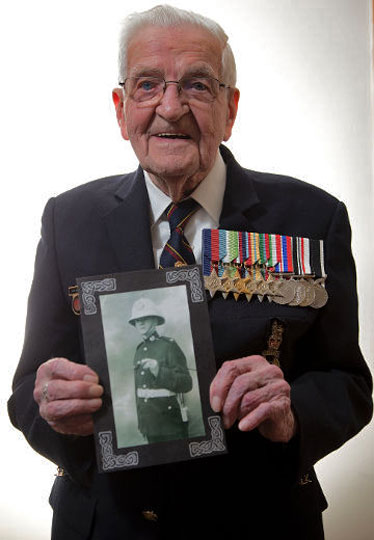 My name is Robert Kennedy. I joined the Royal Marines in September 1937, and my service career took me around the world. During my service during the war, part of it was with the home fleet in the North Atlantic. We ran from there to the Mediterranean, onboard HMS Naiad – a flagship from the 15 Cruiser Squadron, eastern Mediterranean.
My name is Robert Kennedy. I joined the Royal Marines in September 1937, and my service career took me around the world. During my service during the war, part of it was with the home fleet in the North Atlantic. We ran from there to the Mediterranean, onboard HMS Naiad – a flagship from the 15 Cruiser Squadron, eastern Mediterranean.
I took part in the evacuation of Greece and the Battle of Crete, May 1941. The ship was damaged during that Battle of Crete, and after repairs we went on back to the Mediterranean fleet convoys to Malta. During the very rough days, Malta suffered by aerial bombardment – Stukka dive-bombing – and the convoys from Alexandria to Malta, they were heavily bombed, and merchant ships carrying supplies to Malta, on a lot of occasions, quite a few of the merchant ships were sunk. The odd one would get through with vital supplies required.
My ship was torpedoed by a German U-boat on the 11th of March, 1942. From there, we went to a naval camp just outside of Alexandria in the desert, and then we were shipped onboard a troop ship to Durban, South Africa. We were in camp there in Durban for two or three weeks, until such times as the Battleship Valiant came down from the Mediterranean, and into dry dock in Durban for engine repairs, and then from there, when she was ready to join the fleet, we sailed for Mombasa, East Africa.
We joined the eastern Mediterranean fleet. We were there with the eastern Mediterranean fleet until such times as we were returning back to the UK. I left the Valiant there. I took a course – a sniper's course. After the course was completed, I got some foreign service leave and was shipped to Ceylon. Did some jungle training there, with the intentions of operating behind Japanese lines in Burma, but one of the British Cruisers was damaged off the coast of Burma, and a couple of marine gun-layers was killed, so they asked for gun-layers to volunteer to go aboard the New Zealand Cruiser, Gambia. Twelve thousand tons, triple six-inch guns; so that's where I finished up, with the Gambia.
From I Joined up to see the World - The London Free Press - September 2, 2010
Bob Kennedy steps up to the microphone, straightens his tartan cap and glances down at the next bawdy song he'll sing to entertain guests who have come to his south London home to celebrate his 90th birthday. He's the headliner at his own party and that doesn't surprise those who know him best - he's told jokes and has sung songs to friends, family and fellow veterans for as long as they can remember. If someone's surprised, it's Kennedy himself, not that he's the life of the party but that he's alive at all. It's not the first time he's stood on his birthday in awe at his own mortality.
Sixty-five years earlier, Kennedy felt a similar blend of joy and relief as he stood on the deck of HMS Gambia in the Bay of Tokyo, part of an Allied armada there as Japanese leaders signed a surrender that officially ended the Second World War. The Allied force was overwhelming, especially the Americans, and U.S. General Douglas MacArthur timed the ceremony so that as the Japanese leaders lifted the pen to sign surrender documents on the deck of the U.S.S. Missouri, thousands of American planes flew just overhead.
That night, Allied soldiers celebrated and those in the British fleet were treated to a double tot of rum - about five ounces - and the one and only beer they'd get on a naval vessel. That day became VJ-Day in Canada, short for Victory Over Japan Day. It would be mostly overlooked in Europe and celebrated with aplomb in the United States, where the Japanese attack on Pearl Harbour had been the first on American soil since the War of 1812.
For Kennedy, that day meant something more personal: He'd live to see more birthdays after what before had seemed like a path to certain death.mFrom the sunlit room of his kitchen in South London, the Glasgow native recalls how he grew up in the shadow of a military base where he delivered milk to married soldiers and their families. His Scotland of the 1930s was one where men struggled to find work in the face of the Great Depression, so at age 17, Kennedy signed up to become a Royal Marine. "I joined up to see the world. I didn't think there would be a bloody war," he says.
Kennedy pulls out a framed black-and-white photo of his graduating class of 1938, points to several and lingers at one. "Captain Phillips. He was killed at Dieppe. Quite a few of the boys were killed at Dieppe." Kennedy was assigned to man the big guns for the British fleet, first in the Atlantic Ocean, where the Royal Navy struggled with German U-boats to control the shipping lanes.
His closest brush with death came in 1942 in the Mediterranean Sea. The Allies had been using the island of Malta to attack Axis convoys taking supplies to armies in North Africa, so when Nazis blockaded the island, the Allies sent military convoys to get supplies to Malta. Kennedy was assigned to man the big guns of the flagship of the 15th Cruiser Squadron, HMS Naiad, and in March it was lured from port in Alexandria, Egypt, by a false report of a damaged Italian vessel. The ship was in total darkness when Kennedy felt it jolted up from the sea, a torpedo from a U-boat exploding the engine room. The Naiad lurched to the right and quickly began to sink. With explosions rocking the ship, Kennedy and a crew mate made their way to the stern, where seawater was already coming over the deck.
They jumped into waters cold from winter, kept afloat by a life jacket the sailors called a Mae West for the way the chest inflated. Hours passed. Kennedy's arms and legs began to stiffen from the cold. He prayed. In his mind he saw the faces of family back in Scotland, urging him to hang on. After five hours, they were spotted and picked up by a destroyer. Eighty-three of his crew mates perished. But while that night was awful, worse things awaited in the Pacific, where Kennedy joined HMS Gambia, which had been lent to the New Zealand navy.
Tales of Japanese brutality were rampant and Kennedy didn't doubt them when the Allied fleet came under assault at the battle of Okinawa. Kamikazes struck all five British carriers, says Kennedy, slapping his kitchen table five times. One took aim at the Gambia, barely missing. "If you hadn't had a bowel movement for awhile you had one right there. They'd come out of the sky out of nowhere and come straight down." He dreaded what was planned next: An invasion of Japan itself. With mountains framing most of the main island, the only place for an amphibious landing was Tokyo Bay.
The Japanese were dug in and some estimated more than a million Allied casualties if civilians resisted, too. In early August 1945, the Gambia and Allied fleet were ordered to back away 640 kilometres (400 miles) from Japan. Something was up but no one knew what. The world would learn August 6. A single American plane dropped the first atomic bomb on Hiroshima, destroying everything within two kilometres of its detonation, killing 66,000 people from the blast and unleashing radiation that would kill countless more in coming years. On August 9, a second atomic bomb was dropped on Nagasaki, killing between 40,000 and 75,000. Six days later, Japan surrendered. There would be no invasion.
In the weeks after the war, Kennedy went ashore in Japan to bring back Allied prisoners from a prisoner-of-war camp outside Kobe. The city was beautiful but the camp was awful: Prisoners who survived brutal treatment were bone thin, their bellies distended. One told Kennedy he ate snakes and rats to keep alive. Estimates vary considerably of casualties in the Pacific War that began December 7, 1941, when the Japanese launched attacks on Pearl Harbour and British Malaya. But the Americans alone estimated 41,322 soldiers in their force were killed and another 129,274 injured before the Japanese surrender August 15, 1945.
"I don't know, to be quite honest with you, how I got to this age," Kennedy says, his eyes growing watery, his voice tired. "I don't know, It surprised me. Between the battle of Crete, the Malta convoys, the Pacific fleet, Okinawa. Jesus, I'll tell you. Everyone dropped down on their hands and knees and thanked God they dropped those (atomic) bombs. Without that I doubt I'd be here today."
Kennedy lifts his head with resilience learned over nine decades. "I'm here and I'll have a party here Saturday. I'll put on my highland kilt and I'll have a glass of Glenfiddich single malt scotch." How the Scotsman settled in London is an unlikely tale.
After the war, he decided to move to New Zealand, whose beauty had struck him while he served in the Pacific. The normal route of travel east was off-limits because of unexploded mines along the way. So Kennedy went west, with plans to get to Vancouver and sail across the Pacific. With only 50 English pounds - about $200 Cdn - he sailed to New York, then took a train to Toronto. Only then did he learn Vancouver wasn't close to Toronto. "Little did I know the expanse of Canada."
The fare was costly and Kennedy was almost out of money so he hooked up with a fellow Scot who helped him get a job at the Royal York Hotel as a bellhop. "It was the biggest hotel in the British Empire, with 2,300 rooms. I know that because at 2 a.m. I delivered bills under all the doors."
He planned to earn enough to continue his journey. But there was a setback, one he didn't want to discuss, only saying it was related to his military service and he ended up in Sunnybrook Military Hospital. There Kennedy would fall in love with a Canadian nurse named Jessie Bruce and she with him. "Can you see why?" he beams showing her photo.
In 1949 the couple moved to London. Kennedy worked with National Defence and the Ontario Liquor Board. They became parents - Bruce and Jim Kennedy still live in the city - and later grandparents. A long life has brought joy, but also loss. Friends died. Kennedy stopped playing golf in his mid-80s because no one was left to play with. A few years ago Jesse died.
Once there had been 28 Royal Marines in the London region; now it's down to seven. But one tradition endures. Kennedy didn't take many wartime souvenirs and most of what he did he gave to friends. But he still has three Japanese glasses he believes were used by its navy to celebrate victories at sea. Kennedy isn't one for sake - he swears Glenfiddich has been the key to his longevity. Each birthday he fills those glasses with rum. "Every 2nd of September my boys and I have a tot of rum and we say, 'Thank God.'"
From Russia Honours Veteran With Medal, Vodka - The London Free Press - April 28, 2016
When your life is the world of diplomacy and your boss is Vladimir Putin, you're not easily surprised. But the head of the Russian delegation in Toronto was taken aback this month when a 95-year-old Londoner, to be honoured for heroism during the Second World War, not only walked himself into the reception area, but passed up coffee and tea for a vodka. "He was quite surprised I walked in instead of being carried," Londoner Bob Kennedy said.
Kennedy was among four Canadians given medals but the only one of the quartet healthy enough to make the trip to the Toronto consulate on the 14th floor of a tower on Bloor Street. In his case, it was for his role in Britain's Royal Navy, which protected merchant ships taking vital supplies from Loch Ewe, Scotland, through frigid waters north of Norway, to Murmansk, a Russian port above the Arctic Circle.
Kennedy manned the big guns that kept Nazi warplanes away and did so knowing a sinking ship would mean a quick, icy death. "Your life in the water was three minutes," he said. Later in the war, in 1942, Kennedy experienced life in a foundering ship when the flagship of the 15th Cruiser Squadron, HMS Naiad, was sunk in the Mediterranean Sea. He spent five hours in cold water before being spotted and rescued by a destroyer.
Seventy-four years later, it was the vodka served at the consulate that was ice-cold. The guests had been offered tea or coffee, but Kennedy's son Bruce, among family members who accompanied him, asked about vodka. "It was very nice," said Bob Kennedy, who attributes his longevity and good health to a nightcap of Glenfiddich single-malt Scotch.
The Ushakov Medal, named for the 19th-century patriarch of the Russian navy, Fyodor Ushakov, was originally reserved for Soviet war-time heros and later expanded to peacetime service and acts by foreign nationals who protected the Soviet fortunes during the titanic clash with Hitler. It was Putin, the Russian president, who signed the decree that awarded medals to Kennedy and others.
"According to Russian President Vladimir Putin decree No. 131 . . . you are awarded the Russian Ushakov Medal for personal courage and bravery displayed during the Second World War," Consul General Vladimir Pavlov wrote. Asked about the Russian leader, Kennedy said, "Putin is not the laughing type. He doesn't smile so much . . . But it's a lot better than when (Josef) Stalin was around."
Kennedy was born in Glasgow, Scotland in 1920 and grew up close to a military base. He delivered milk to soldiers and their families. In 1939 he signed up to become a Royal Marine. He would survive attacks by German U-boats and Japanese kamikaze pilots and see the war end five years later on the deck of HMS Gambia, in Tokyo Bay, when Japanese leaders signed a surrender that officially ended the Second World War. From a solitary marine in a massive Allied armada, to the only veteran in a Toronto consulate, Kennedy has felt the loss of comrades and time: "There's not too many of us left."
When I was putting this page together I noticed an odd coincidence. The first picture is of Jim Murray who now lives in New Zealand. The second is of Bob Kennedy who now lives in South London, Ontario. But in August 1945, they were both on HMNZS Gambia in the Tokyo Bay. Jim as a gunner in "A" turret, Bob as a Royal Marine.
On August 20, there was a RN/RM landing force from the ship that took the surrender of Yokosuka Naval Base. It would be nice to know if both these men were in that land force and that was where the glasses were liberated from.
